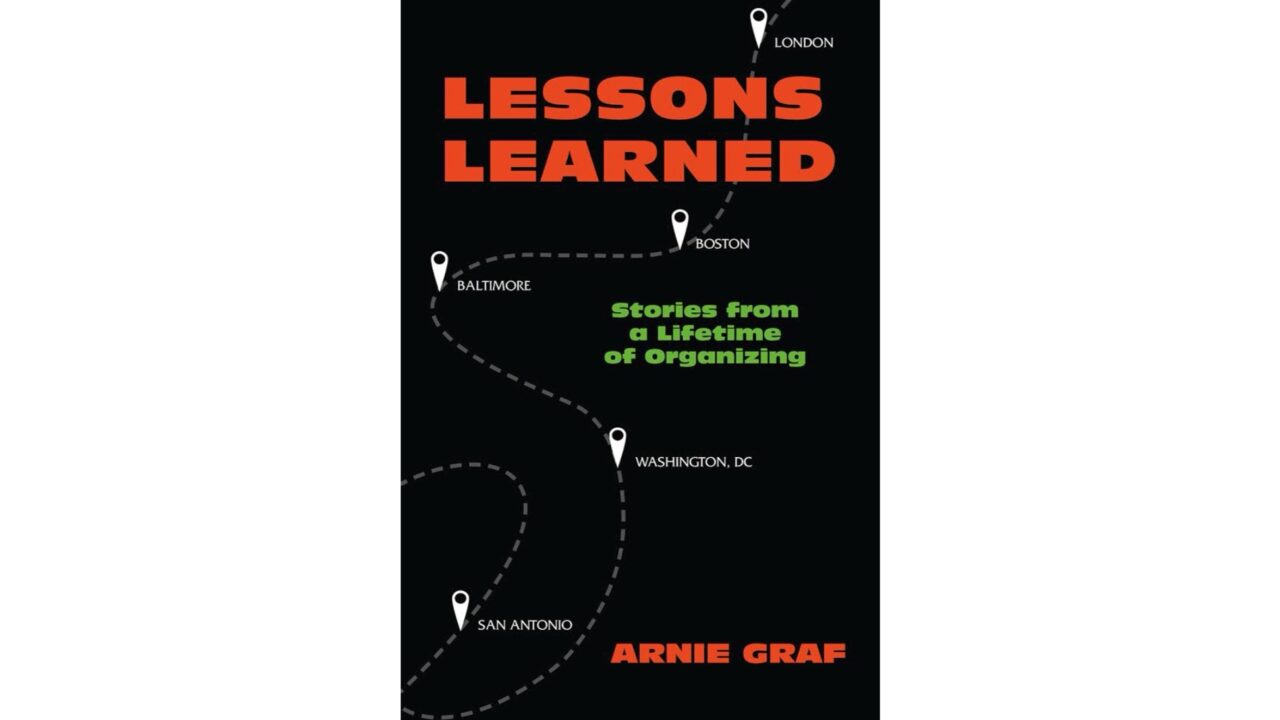A review of Lessons Learned: Stories from a Lifetime of Organizing by Arnie Graf. Read an excerpt from the book here.
Even though it was over twenty years ago, I remember the first time I met Arnie Graf with perfect clarity. We had just sat down for coffee at a cafe in Baltimore and, within minutes, I felt like I was the only person in the world. That’s the magic of Arnie. He focuses on the person in front of him with full intention and respect. Arnie’s curiosity about people likely comes naturally to him — but it’s also a skill that he’s crafted and refined over decades of one-on-one meetings. It is a skill that comes through in the stories relayed in his book, Lessons Learned: Stories From A Lifetime Of Organizing.
Lessons Learned begins by highlighting what Arnie considers the essentials of organizing:
-
understand power;
-
identify self-interest;
-
build relationships;
-
understand the difference between problems and issues; and
-
create change through action and reaction
The rest of the book illustrates these essentials through stories from Arnie’s forty years of organizing, winning, and losing in San Antonio, Boston, Baltimore, Milwaukee, and Washington, DC. Arnie invites his readers into the lives of the leaders he collaborated with and the issues they worked to solve together. For example, in recounting his work with Baltimoreans United in Leadership Development (BUILD), Arnie demonstrates the power of the maxim, “The organization has no permanent enemies and no permanent allies — only permanent interests.”
Throughout the 1980s, Baltimore’s Mayor Schaefer and the leaders of BUILD deeply distrusted each other — distrust that only grew when Schaefer became Mayor and BUILD helped to defeat his hand-picked replacement. Still, when Schaefer faced a ballot referendum to overturn his newly-passed gun control legislation, he needed BUILD to help turn out voters in Baltimore. BUILD leaders were still not fond of Schaefer, but they wanted his support for an affordable housing project the following year. Applying the principle of self-interest, BUILD leaders conducted a highly visible get-out-the-vote campaign to defeat the referendum. A year later, Schaefer made $12.2 million available for low-interest financing to assist BUILD’s housing development project. Just as importantly, Schaefer recognized the organization by showing up at a BUILD meeting and shaking hands with BUILD leaders in front of five hundred people and the media.
Arnie spent his organizing career with the Industrial Areas Foundation (IAF) and the organizing essentials he describes are rooted in the IAF approach to building and deploying power: relational power. Relational power rests in the strength of the relationships that are built among leaders and community members. It starts with conversations to build trust, identify interests, and identify leaders with a desire to take action on behalf of their community. There are many critiques of the IAF’s approach to community organizing, but, in reading Arnie’s book, one comes away with a rich sense of the power of relationships as well as the discipline, time, and training it takes to build trust and reciprocity. In Lessons Learned, Arnie invites others to consider a career in organizing as a way to lead a life of action, creativity, self-examination, and deep relationships.
I have thought about my first meeting with Arnie many times over the years. I have no recollection at all of what I said to him, but I still smile when I remember one of the things he said to me: “I like people who like getting into mischief.” You’ll find many stories in Lessons Learned about how Arnie got into mischief … the good kind that leads to change.
Other Books About the Industrial Areas Foundation
-
Roots for Radicals: Organizing for Power, Action, and Justice by Edward T. Chambers
-
Going Public: An Organizer’s Guide to Citizen Action by Michael Gecan
-
Hope for Justice and Power: Broad-based Community Organizing in the Texas Industrial Areas Foundation by Kathleen Staudt
-
Valley Interfaith and School Reform Organizing for Power in South Texas by Dennis Shirley
